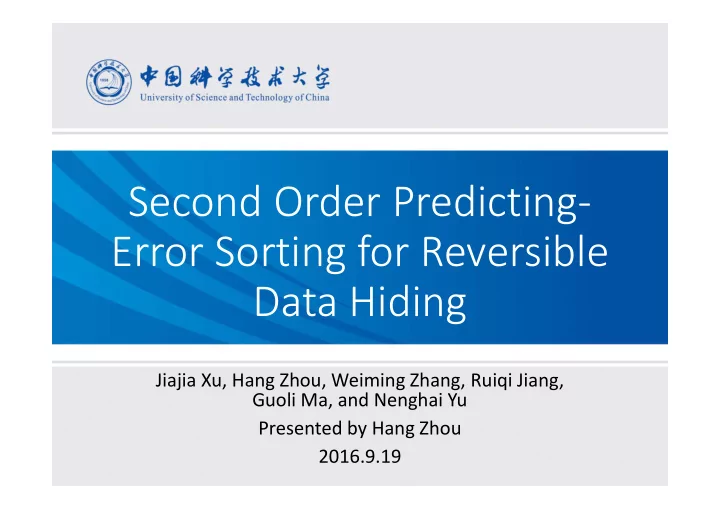

Second Order Predicting- Error Sorting for Reversible Data Hiding Jiajia Xu, Hang Zhou, Weiming Zhang, Ruiqi Jiang, Guoli Ma, and Nenghai Yu Presented by Hang Zhou 2016.9.19
Content Introduction of Reversible Data Hiding (RDH) Proposed Method Second Order Predicting-Error Based on Correlation Among Color Channels Second Order Predicting-Error Sorting Based on Generalized Normal Distribution Experiment & Conclusion
Framework of RDH
Related Work Prediction median edge detection (MED) gradient adjusted prediction (GAP) differential adaptive run coding (DARC) extended gradient-based selection and weighting (EGBSW) Sorting reduce the location map by arranging the pairs of pixels in order use local variance values to sort the predicted errors use the sum of absolute differences between diagonal blank pixels in local region RDH for color images based on prediction-error expansion that can enhance the prediction accuracy in one color channel through exploiting the edge information from another channel
Proposed Method Second order predicting-error A double layered embedding method � � � � � � � � �� �� �� �� � � � � indicates whether the reference sample is located on an edge. � � � � � � � � � ��� ��� � � ��� ��� ��� � �� � � � � For instance, when � , then ��� � � �� � � � � � . � ��� �
Second Order Prediction-Error First order predicting- error: Second order predicting- error: Prediction-error sequence: Entropy is used to evaluate the performance of prediction.
Sorting Based on Generalized Normal Distribution Generalized normal distribution density function: Since and , � � � �
Sorting Based on Generalized Normal Distribution : � �
Sorting Based on Generalized Normal Distribution , and the expectation of function has positive correlation to . � � � � � � � � � � are used in data embedding
Framework of Data Hiding for the 3 Channels
Experiment & Analysis [11] J Li, X Li, B Yang. Reversible data hiding scheme for color image based on prediction-error expansion and cross-channel correlation . Signal Processing, 2013. [12] J. Li, X. Li, B. Yang. PEE-based reversible watermarking for color image. ICIP, 2012. [13] V. Sachnev, H. J. Kim, J. Nam, S. Suresh, and Y. Shi. Reversible watermarking algorithm using sorting and prediction. IEEE TCSVT., 2009. [14] A.M. Alattar. Reversible watermark using the difference expansion of a generalized integer transform. IEEE TIP, 2004. [15] Y. Hu, H. Lee, J. Li. DE-based reversible data hiding with improved overflow location map. IEEE TCSVT, 2009. [16] H. Yang, K. Hwang. Reversible data hiding for color BMP image based on block difference histogram. Proceedings of the Fourth International Conference on Ubimedia Computing (U-Media), 2011.
Experiment & Analysis [11] J Li, X Li, B Yang. Reversible data hiding scheme for color image based on prediction-error expansion and cross-channel correlation . Signal Processing, 2013. [12] J. Li, X. Li, B. Yang. PEE-based reversible watermarking for color image. ICIP, 2012. [13] V. Sachnev, H. J. Kim, J. Nam, S. Suresh, and Y. Shi. Reversible watermarking algorithm using sorting and prediction. IEEE TCSVT., 2009. [14] A.M. Alattar. Reversible watermark using the difference expansion of a generalized integer transform. IEEE TIP, 2004. [15] Y. Hu, H. Lee, J. Li. DE-based reversible data hiding with improved overflow location map. IEEE TCSVT, 2009. [16] H. Yang, K. Hwang. Reversible data hiding for color BMP image based on block difference histogram. Proceedings of the Fourth International Conference on Ubimedia Computing (U-Media), 2011.
Conclusion Propose a novel second order predicting and sorting technique for reversible data hiding. The method make full use of the feature of the edge information obtained from another color channel and high correlation between adjacent pixels. So it will reflect the local context complexity for pixel and prediction accuracy of prediction-error. Experimental results show that the proposed method has better results compared to the other six recent works of Li et al. [11], Li et al.[12], Sachnev et al. [13], Alattar [14], Hu et al. [15], Yang and Huang [16].
T HANKS F OR L ISTENING! Email: zh2991@mail.ustc.edu.cn
Recommend
More recommend